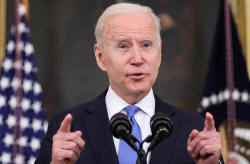Explainer-Republicans blame Biden for inflation, but are they right?
 Send a link to a friend
Send a link to a friend
 [November 01, 2021] By
David Morgan [November 01, 2021] By
David Morgan
WASHINGTON (Reuters) - While Democrats
struggle to pass President Joe Biden's social and climate change agenda,
Republicans have been pelting them with the repeated accusation that his
policy initiatives are driving up inflation and making life costlier for
Americans.
The U.S. consumer price index has risen at more than a 5% annual rate
for four months in a row, while the economy suffers from labor and
supply shortages caused by the COVID-19 pandemic. Treasury Secretary
Janet Yellen predicted late last month that inflation would remain high
into next year.
"There's no relief in sight. It's a direct result of flooding the
country with money," Senate Minority Leader Mitch McConnell, the
chamber's top Republican, told reporters last week. "The last thing we
need to do is pile on with another massive, reckless tax and spending
spree."

McConnell spoke during a 13-minute news conference, during which he and
his leadership team made at least two dozen references to inflation and
rising costs or prices.
But are Republicans right to blame higher prices on Biden and the
Democrats? Not entirely.
WHAT'S HAPPENING AROUND THE GLOBE?
The United States is hardly alone
https://www.reuters.com/business/
only-way-is-up-corporate-chiefs-warn-prices-2021-10-21 in enduring a
bout of stiff inflation.
A headline measure tracked by the Organization for Economic Cooperation
and Development shows inflation across the 38 member countries running
at the highest level since 2008, lifted in no small part by the global
surge in energy prices. Oil prices alone have quadrupled in the last 18
months as energy demand recovered with economies reopening from COVID-19
shutdowns.
(GRAPHIC: Global inflation perks up - https://graphics.reuters.com/USA-BIDEN/INFRASTRUCTURE-INFLATION/xmvjolwagpr/chart.png)
WHAT ABOUT STIMULUS SPENDING?
The main Republican argument against Biden is that his multitrillion-dollar
legislative agenda makes inflation worse by flooding the economy with
government spending, and promising much more.
His agenda includes the $1.9 trillion American Rescue Plan
https://www.reuters.com/article/
us-health-coronavirus-biden/biden-all-u-s-adults-to-be-eligible-for-vaccines-by-may-some-normalcy-coming-by-summer-idUSKBN2B31DN
- the only plank so far enacted - and a yet-to-pass $1 trillion
infrastructure bill. After that will come his "Build Back Better
https://www.reuters.com/world/us/
schumer-manchin-continuing-talks-with-biden-delaware-source-2021-10-24"
social and climate spending package, which is anticipated to cost around
$1.75 trillion.

But the annual inflation rates for dozens and dozens of goods routinely
purchased by American households - including food - were already at
their highest levels in a decade before Biden entered the White House
early this year.
That's in large part because of the COVID-19 relief spending enacted
under Republican Donald Trump's administration with overwhelming
Republican support in the Senate. It exceeds what Democrats have
allocated so far by roughly $1 trillion.
That money kept household balance sheets intact during the crisis and
allowed consumers to keep spending despite double-digit unemployment.
Moreover, household savings rocketed to unprecedented levels, providing
tinder for more spending on activities like dining out and travel once
those became widely available again.
(GRAPHIC: Key inflation gauges started rising in 2020 - https://graphics.reuters.com/USA-BIDEN/INFRASTRUCTURE-INFLATION/dwvkramxxpm/chart.png)
Republicans point to concerns raised by former Treasury Secretary Larry
Summers, a Democrat who warned in a February Washington Post Op-Ed
https://www.washingtonpost.com/
opinions/
2021/02/04/larry-summers-biden-covid-stimulus that Biden's American
Rescue Plan could fuel inflation. But other economists, including Mark
Zandi of Moody's Analytics https://www.moodysanalytics.com/-/media/article/2021/macroeconomic-consequences-infrastructure.pdf,
have since said that the Biden agenda is more likely to lift the
economy's long-term growth prospects and ease inflation.
[to top of second column] |

U.S. President Joe Biden
delivers remarks on the state of his American Rescue Plan from the
State Dining Room at the White House in Washington, D.C., U.S., May
5, 2021. REUTERS/Jonathan Ernst

ARE VACCINE MANDATES DRIVING INFLATION?
Republicans claim Biden's COVID-19 vaccine mandates
https://www.reuters.com/world/
us/biden-deliver-six-step-plan-covid-19-pandemic-2021-09-09 for most
federal workers and for private businesses with more than 100 employees
are exacerbating a national labor shortage at a time when inflationary
pressures are affecting both wages
https://www.reuters.com/business/
us-economy-grew-modest-moderate-rate-feds-beige-book-2021-10-20 and
prices.
It is true that employment and workforce growth have slowed in recent
months and employers are struggling to find workers - there were 10.4
million job openings in August, near a record high.
But the deadline for complying with the vaccine mandate is still more
than a month off, and no firm data exists to validate this assertion,
though a number of large companies have begun voicing concerns about
their ability to retain and hire workers because of it. Others, like
United Airlines
https://www.reuters.com/business/
healthcare-pharmaceuticals/
united-airlines-says-more-than-99-us-employees-have-been-vaccinated-2021-09-28,
said they saw a surge in applications for employment after adopting
vaccine mandates.
The mandates are aimed at protecting Americans from COVID-19, at a time
when only 67% of the U.S. population has received at least one dose of a
vaccine, according to the Reuters COVID-19 Vaccine Tracker https://graphics.reuters.com/world-coronavirus-tracker-and-maps/vaccination-rollout-and-access.
Republicans allege the mandates are forcing workers who refuse to be vaccinated
out of the labor force.

While thousands of workers https://www.reuters.com/world/us/us-workers-face-layoffs-us-covid-19-vaccine-mandates-kick-2021-10-19
across the United States do face potential job losses, vaccine resistance is
strongest in Republican-led states where it has been largely reinforced by
Republican officials.
WHAT DID ENHANCED UNEMPLOYMENT BENEFITS DO?
Republicans argue that "exorbitant handouts
https://www.foxbusiness.com/
politics/fix-supply-chain-crisis-incentives-return-to-work-rep-hern-rep-harshbarger"
from the federal government, including a $300 weekly federal pandemic
unemployment benefit, also have contributed to the labor shortage and rise in
inflation.
But those unemployment payments, which ended nationally in September, appear to
have had limited impact on labor market participation. The mostly Republican-led
states that blocked the payments added jobs in August at less than half the pace
https://www.reuters.com/business/
amid-covid-surge-states-that-cut-benefits-still-see-no-hiring-boost-2021-09-17
of other states that allowed the payments to flow.
WHAT EFFECT ARE SUPPLY-CHAIN WOES HAVING?
Republicans also want to blame Biden for the supply-chain shortage that has
contributed to inflation.
But experts say the COVID-19 pandemic has disrupted every aspect of the global
supply chain
https://www.reuters.com/business/
few-options-g7-trade-chiefs-alleviate-supply-pinch-2021-10-21, from
manufacturing and transportation to logistics, and not only in the United States
but worldwide, at a time when the pandemic has also sparked a buying spree. The
problem is partly due to a decades-old business strategy that aims to keep
inventories lean.
(Reporting by David Morgan; Editing by Dan Burns, Scott Malone and Paul Simao)
[© 2021 Thomson Reuters. All rights
reserved.] Copyright 2021 Reuters. All rights reserved. This material may not be published,
broadcast, rewritten or redistributed.
Thompson Reuters is solely responsible for this content.
 |